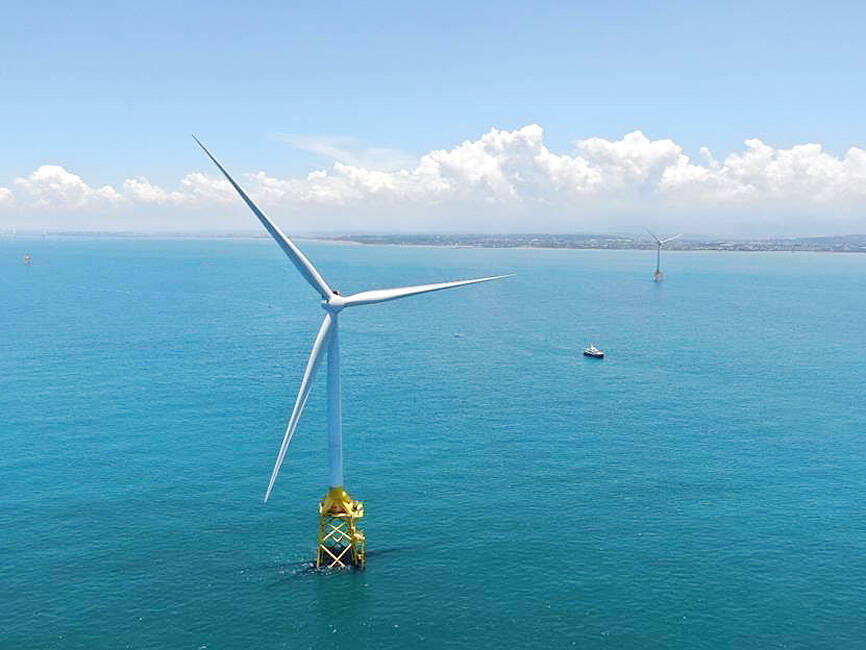Government-approved foreign direct investment (FDI) in the first seven months of this year rose by more than 200 percent from a year earlier, due to investment pledges by offshore wind power developers.
Approved FDI totaled US$9.69 billion over the period, up 201.84 percent from a year earlier, while the number of approved FDI applications fell 7.04 percent from a year earlier to 1,426, Investment Commission figures showed on Monday.
The growth in approved FDI largely resulted from the government’s push for green energy development, with three wind power investment applications accounting for about 43 percent of the total FDI in the first seven months, the commission said.

Photo courtesy of Formosa II Wind Power Co
During the period, the commission issued approved an application by Denmark’s Orsted Wind Power TW Holding A/S to invest NT$93.66 billion (US$3.09 billion) in offshore wind projects in Taiwan.
It also approved applications from Netherlands-based NP Hai Long Holdings BV and Denmark-based CI II Changfang K/S to invest NT$20.04 billion and NT$10.56 billion respectively in local offshore wind development.
Companies from countries covered by the government’s New Southbound Policy gained the commission’s approval to invest a combined US$1.52 billion, up 327.54 percent from a year earlier.
The commission said the pledged investment largely came from Australia, Singapore and Thailand.
The policy aims to enhance trade and exchanges with 16 countries in Southeast and South Asia, as well as Australia and New Zealand, to reduce Taiwan’s dependence on China.
Meanwhile, approved investments by China-based companies totaled US$17.698 million in the first seven months, down 36.52 percent from a year earlier, the commission said.
The value of Taiwan’s approved foreign-bound investments in the first seven months fell 33.89 percent from a year earlier to US$5.02 billion.
The commission approved US$2.25 billion of investment bound for policy countries, down 55.71 percent from a year earlier, with Singapore, Australia and Vietnam the major destinations.
Approved China-bound investments rose 0.01 percent from a year earlier to US$2.11 billion, the commission said.

UNCERTAINTY: Innolux activated a stringent supply chain management mechanism, as it did during the COVID-19 pandemic, to ensure optimal inventory levels for customers Flat-panel display makers AUO Corp (友達) and Innolux Corp (群創) yesterday said that about 12 to 20 percent of their display business is at risk of potential US tariffs and that they would relocate production or shipment destinations to mitigate the levies’ effects. US tariffs would have a direct impact of US$200 million on AUO’s revenue, company chairman Paul Peng (彭雙浪) told reporters on the sidelines of the Touch Taiwan trade show in Taipei yesterday. That would make up about 12 percent of the company’s overall revenue. To cope with the tariff uncertainty, AUO plans to allocate its production to manufacturing facilities in

Taiwan will prioritize the development of silicon photonics by taking advantage of its strength in the semiconductor industry to build another shield to protect the local economy, National Development Council (NDC) Minister Paul Liu (劉鏡清) said yesterday. Speaking at a meeting of the legislature’s Economics Committee, Liu said Taiwan already has the artificial intelligence (AI) industry as a shield, after the semiconductor industry, to safeguard the country, and is looking at new unique fields to build more economic shields. While Taiwan will further strengthen its existing shields, over the longer term, the country is determined to focus on such potential segments as

COLLABORATION: Given Taiwan’s key position in global supply chains, the US firm is discussing strategies with local partners and clients to deal with global uncertainties Advanced Micro Devices Inc (AMD) yesterday said it is meeting with local ecosystem partners, including Taiwan Semiconductor Manufacturing Co (TSMC, 台積電), to discuss strategies, including long-term manufacturing, to navigate uncertainties such as US tariffs, as Taiwan occupies an important position in global supply chains. AMD chief executive officer Lisa Su (蘇姿丰) told reporters that Taiwan is an important part of the chip designer’s ecosystem and she is discussing with partners and customers in Taiwan to forge strong collaborations on different areas during this critical period. AMD has just become the first artificial-intelligence (AI) server chip customer of TSMC to utilize its advanced

While China’s leaders use their economic and political might to fight US President Donald Trump’s trade war “to the end,” its army of social media soldiers are embarking on a more humorous campaign online. Trump’s tariff blitz has seen Washington and Beijing impose eye-watering duties on imports from the other, fanning a standoff between the economic superpowers that has sparked global recession fears and sent markets into a tailspin. Trump says his policy is a response to years of being “ripped off” by other countries and aims to bring manufacturing to the US, forcing companies to employ US workers. However, China’s online warriors